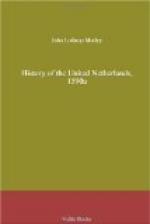Especially upon number one was concession impossible. “The Catholic religion is the first thing,” said Philip, “and although the rebels do not cease to insist that liberty of conscience should be granted them, in order that they may preserve that which they have had during these past years, this is never to be thought of in any event.” The king always made free use of the terrible weapon which the Protestant princes of Germany had placed in his hands. For indeed if it were right that one man, because possessed of hereditary power over millions of his fellow creatures, should compel them all to accept the dogmas of Luther or of Calvin because agreeable to himself, it was difficult to say why another man, in a similarly elevated position, might not compel his subjects to accept the creed of Trent, or the doctrines of Mahomet or Confucius. The Netherlanders were fighting—even more than they knew-for liberty of conscience, for equality of all religions; not for Moses, nor for Melancthon; for Henry, Philip, or Pius; while Philip justly urged that no prince in Christendom permitted license. “Let them well understand,” said his Majesty, “that since others who live in error, hold the opinion that vassals are to conform to the religion of their master, it is insufferable that it should be proposed to me that my vassals should have a different religion from mine—and that too being the true religion, proved by so many testimonies and miracles, while all others are deception. This must be arranged with the authority of the commissioners of the emperor, since it is well understood by them that the vassal is never to differ from the opinion of his master.” Certainly it was worth an eighty years’ war to drive such blasphemous madness as this out of human heads, whether crowned or shaven.
There was likewise a diet held during the summer of this year, of the circles of the empire nearest to the Netherlands—Westphalia, Cleves, Juliers, and Saxony—from which commissioners were deputed both to Brussels and to the Hague, to complain of the misfortunes suffered by neutral and neighbouring nations in consequence of the civil war.
They took nothing by their mission to the Duke of Parma. At the Hague the deputies were heard on the 22nd August, 1590. They complained to the States-General of “brandschatting” on the border, of the holding of forts beyond the lines, and of other invasions of neutral territory, of the cruising of the war-vessels of the States off the shores and on the rivers, and of their interference with lawful traders. Threats were made of forcible intervention and reprisals.




